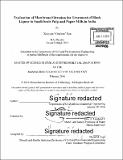Evaluation of membrane filtration for treatment of black liquor in small-scale pulp and paper mills in India
Author(s)
Ren, Xiaoyuan, S.M. (Xiaoyuan Charlene). Massachusetts Institute of Technology
DownloadFull printable version (27.32Mb)
Other Contributors
Massachusetts Institute of Technology. Department of Civil and Environmental Engineering.
Advisor
John H. Lienhard V.
Terms of use
Metadata
Show full item recordAbstract
Black liquor, a strongly polluting byproduct from the kraft pulping process in pulp and paper mills, is traditionally treated by being passed through multiple effect evaporators and burned in a recovery boiler to produce energy and recover chemicals. However, the traditional treatment of black liquor is not economically viable for the small-scale kraft paper mills in India that uses waste agricultural products as raw material to produce brown paper. Membrane ultrafiltration treatment has been advocated by many scholars as a possible alternative treatment method for black liquor, and this study attempts to address industrial concerns on the cost-effectiveness of membranes for black liquor concentration and treatment. Utilizing a cross-flow hollow fiber membrane module in a recirculation system operating under constant pressure, black liquor is recirculated through the system over an extended period of time to observe the quantity and quality of the lignin in the concentrate and the permeate, and how they vary over time. Additionally, the permeate flux rate change over time is also observed to determine the required frequency of cleaning membranes from reversible fouling of membranes, as well as the frequency to replace membranes due to irreversible fouling. Cost of cleaning and changing membranes, as well as the profit gained from lignin retained can be estimated and compared with literature to determine the cost-effectiveness of ultrafiltration membranes in treating black liquor. Experimental results suggest that operating at a pressure of 207 kPa and a cross-flow velocity of 1.06 m/s, the average permeate flux of black liquor is 7-21 LMH when concentrating lignin in black liquor from a concentration of 38 g/L to 185 g/L, which compares favorably to literature results. However, a membrane cleaning frequency of every 4 to 6 hours and an estimated membrane lifetime of several weeks, predicted by experimental results, significantly raises the cost of cleaning and changing membranes in comparison to the commonly estimated membrane cleaning frequency of once per day and lifetime of 1.5 year in literature. The permeate lignin concentration, which increased up to 40 g/L at the end of a concentration cycle, would also decrease the profit gained from reusing the permeate stream in the cooking process. The increased cost factors associated with both intense membrane fouling and the need for permeate stream retreatment require to be addressed in future research, in order to more comprehensively evaluate membrane filtration process as a cost-effective alternative for treating black liquor.
Description
Thesis: S.M., Massachusetts Institute of Technology, Department of Civil and Environmental Engineering, 2016. Cataloged from PDF version of thesis. Includes bibliographical references (pages 153-157).
Date issued
2016Department
Massachusetts Institute of Technology. Department of Civil and Environmental EngineeringPublisher
Massachusetts Institute of Technology
Keywords
Civil and Environmental Engineering.